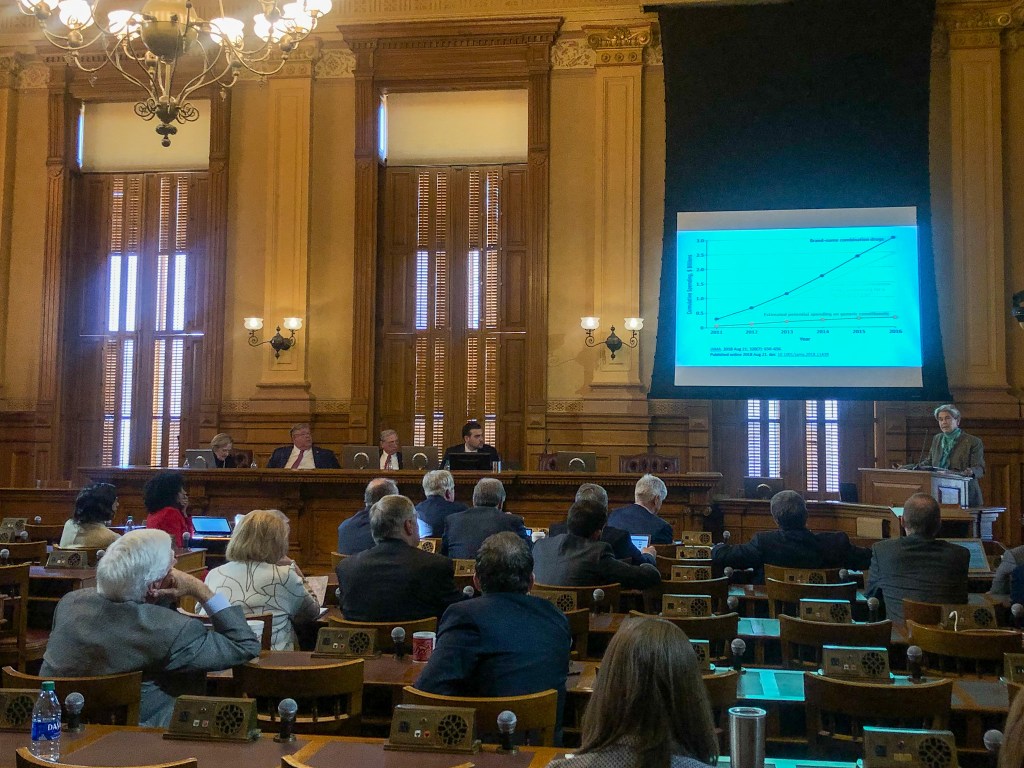Lawmakers struggle to buoy local pharmacies
Published 2:15 pm Tuesday, January 7, 2020

- Dr. Jean Sumner, dean of the Mercer School of Medicine, testifies in front of lawmakers about the harmful affects of large pharmacy benefit managers and Medicaid managed care organizations on Jan. 7 in Atlanta.
ATLANTA — Independent pharmacies in Georgia are saying big pharmaceutical management companies are running them out of business, and lawmakers are struggling with what they can do to even the playing field.
The independent pharmacists told lawmakers Tuesday that large pharmaceutical managers are already ignoring the state’s anti-steering laws that went into effect Jan. 1.
A Joint Special Committee on Access to Health Care and Insurance convened within days of the first session to hear testimony from Georgia pharmacists, patients and physicians on how pharmacy benefit managers — third-party drug providers such as CVS and Express Scripts — and Medicaid managed care organizations “rig the system” to profit from patient’s drug needs.
“Calling this meeting so close to the session hasn’t been taken lightly,” Rep. Eddie Lumsden, R-Armuchee, chairman of the House insurance committee, said. “It’s being convened because we believe that it’s necessary.”
Last session, Rep. David Knight, the Griffin Republican, led legislation that passed with almost unanimous bipartisan support to prevent large pharmacy benefit managers from steering patients away from independent pharmacies to often more expensive drugs with unreliable prescription services.
The problem still persists in Georgia despite legislative efforts — at great cost to rural areas that have high rates of chronic diseases and are suffering an extreme physician shortage.
The House Majority Caucus announced in the hours following the meeting that Knight will spearhead additional legislation this session “closing loopholes in existing laws” and bringing oversight to pharmaceutical management companies and Medicaid managed care organizations contracted with the state. The legislation will carve out prescription drug benefits from Medicaid managed care — intended to save money while compensating local pharmacies equally.
There are 350 to 400 independent pharmacists in rural Georgia, Dr. Jean Sumner, dean of the Mercer School of Medicine, said, who are the number one partners to rural physicians.
“This is a matter of health literacy. Health literacy has nothing to do with intelligence and education, it has to do with understanding the system and using the system effectively,” Sumner said. “… Physicians in rural Georgia need their independent pharmacy colleagues.”
The largest pharmacy benefit managers include CVS Health, Express Scripts and United Health that physicians and pharmacists said dominate the drug market through insurance claim mandates that require patients to receive brand-name drugs and drugs by mail to be covered.
This prevents physicians from working with local pharmacies that are familiar with their patients and creates masses of paperwork to prescribe cheaper generic prescription drugs. Physicians said they even find themselves in situations where a drug is sitting on their shelf but patients are forced to wait for prescriptions through a mail order.
“Pharmacy benefit managers have not affected health status,” Sumner said, “they may say they do, but they have actually interfered with access to drugs…I should be able to write the cheapest, safest and most effective drug and I can’t do it.”
Cancer survivor Katie Groover told lawmakers she was nervous to speak Tuesday, but after hearing the first couple of testimonies, she said her “blood was boiling.”
Diagnosed with myeloma, Groover has struggled with mail-order pharmacies to get the specialized prescriptions she needs. She recounted months of back and forth with the mail-order drug company Accredo.
“I don’t know these people,” she said. “They don’t know me and I don’t think I’ve ever talked to the same person twice.”
Groover said when she ran out of money to pay prescription drug costs, the calls stopped coming from the company. She is now living off of prescriptions straight from the manufacturer — coordinated through her doctor — but she’s not sure how long that stream of medicine will last.
Groover said going through cancer treatment, she has met dozens of patients facing similar obstacles “all to get the lifesaving drugs they can’t afford.”
Jennifer Shannon, who runs Lily’s Pharmacy in Johns Creek, said while Groover’s story is “horrifying,” it is not unique. Patients who have to receive prescription help through mail-order company call centers are getting their health-care advice from a call-center representative.
In one instance, she said, a representative told a patient who needed a refill on her insulin that her box of expired insulin “is better than no insulin at all.”
“They don’t care about patients nor do they care about improving their disease states. This local pharmacists does,” Shannon said. “When a brand-name drug is mandated when there is a therapeutic generic drug available, that is not a clinical decision. That is a profit-driven decision.”
Nikki Bryant, cousin of the late Sen. Greg Kirk and pharmacist in Southwest Georgia, said state contracts with Medicaid managed care organizations — that control drug pricing — are putting local pharmacies out of business.
“Government contracts in this state that my taxpayer dollars are going to,” she said, “are working to put me out of business.”
Knight said he has tried to receive copies of Medicaid managed care organization contracts with the state via public records requests, but hasn’t seen “a single page.”
Knight said government-controlled health care — referencing debate on Gov. Brian Kemp’s health-care waivers — has dominated conversation but lawmakers are “missing the bigger picture.”
“We the members of the General Assembly are tasked with appropriating funds,” he said, “but we are doing it in the darkness.”


